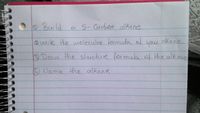
Chemistry
10th Edition
ISBN: 9781305957404
Author: Steven S. Zumdahl, Susan A. Zumdahl, Donald J. DeCoste
Publisher: Cengage Learning
expand_more
expand_more
format_list_bulleted
Question
Can you please answer this?

Transcribed Image Text:**Title: Building and Analyzing a 5-Carbon Alkene**
**Objective:**
The following steps guide you through the process of constructing a 5-carbon alkene, determining its molecular formula, drawing its structural formula, and naming the compound.
**Instructions:**
1. **Build a 5-Carbon Alkene**
Begin by constructing a simple alkene containing five carbon atoms. Alkenes are hydrocarbons with at least one carbon-carbon double bond, which affects their structural and chemical properties.
2. **Write the Molecular Formula of Your Alkene**
Calculate the number of hydrogen atoms and write the complete molecular formula for your alkene. Remember, alkenes follow the general formula CnH2n.
3. **Draw the Structural Formula of the Alkene**
Illustrate the arrangement of atoms, showing all bonds including the double bond. This helps visualize the compound's structure and confirms the presence of the double bond characteristic of alkenes.
4. **Name the Alkene**
Assign the appropriate IUPAC name to your alkene, based on the longest carbon chain containing the double bond and the position of the double bond within the chain.
**Conclusion:**
Understanding these steps is fundamental for mastering organic chemistry concepts related to hydrocarbons and their derivatives. Practice will enhance your ability to identify and name various alkene structures confidently.
Expert Solution
This question has been solved!
Explore an expertly crafted, step-by-step solution for a thorough understanding of key concepts.
This is a popular solution
Trending nowThis is a popular solution!
Step by stepSolved in 2 steps with 1 images

Knowledge Booster
Learn more about
Need a deep-dive on the concept behind this application? Look no further. Learn more about this topic, chemistry and related others by exploring similar questions and additional content below.Similar questions
- Rank the following diatomic species of fluorine in order of bond length and bond strength. A. F2 B. F₂+ C. F₂ Bond Length Bond Strength Longest Next Shortest Strongest Next Weakestarrow_forwardUse the acidity model pH = −log[H+], where acidity (pH) is a measure of the hydrogen ion concentration [H+] (measured in moles of hydrogen per liter) of a solution.Find the pH when [H+] = 4.7 × 10−5. (Round your answer to two decimal places.)pH =arrow_forwardWhat’s the answerarrow_forward
- Bi-214 --> He-4 +arrow_forwardThere are three possible Grignard reactions that lead to the given alcohol. Select the reactant needed for each of the indicated Grignard reagents. MgBr 1) ? 2) HO oi or OH OH ofarrow_forwardHighest Ką value Ka Lowest Ką value Ka Answer Bank CICH₂CH₂COOH CICH, COOH Cl₂ CHCOOH CH₂CH₂COOH 2arrow_forward
arrow_back_ios
arrow_forward_ios
Recommended textbooks for you
 ChemistryChemistryISBN:9781305957404Author:Steven S. Zumdahl, Susan A. Zumdahl, Donald J. DeCostePublisher:Cengage Learning
ChemistryChemistryISBN:9781305957404Author:Steven S. Zumdahl, Susan A. Zumdahl, Donald J. DeCostePublisher:Cengage Learning ChemistryChemistryISBN:9781259911156Author:Raymond Chang Dr., Jason Overby ProfessorPublisher:McGraw-Hill Education
ChemistryChemistryISBN:9781259911156Author:Raymond Chang Dr., Jason Overby ProfessorPublisher:McGraw-Hill Education Principles of Instrumental AnalysisChemistryISBN:9781305577213Author:Douglas A. Skoog, F. James Holler, Stanley R. CrouchPublisher:Cengage Learning
Principles of Instrumental AnalysisChemistryISBN:9781305577213Author:Douglas A. Skoog, F. James Holler, Stanley R. CrouchPublisher:Cengage Learning Organic ChemistryChemistryISBN:9780078021558Author:Janice Gorzynski Smith Dr.Publisher:McGraw-Hill Education
Organic ChemistryChemistryISBN:9780078021558Author:Janice Gorzynski Smith Dr.Publisher:McGraw-Hill Education Chemistry: Principles and ReactionsChemistryISBN:9781305079373Author:William L. Masterton, Cecile N. HurleyPublisher:Cengage Learning
Chemistry: Principles and ReactionsChemistryISBN:9781305079373Author:William L. Masterton, Cecile N. HurleyPublisher:Cengage Learning Elementary Principles of Chemical Processes, Bind...ChemistryISBN:9781118431221Author:Richard M. Felder, Ronald W. Rousseau, Lisa G. BullardPublisher:WILEY
Elementary Principles of Chemical Processes, Bind...ChemistryISBN:9781118431221Author:Richard M. Felder, Ronald W. Rousseau, Lisa G. BullardPublisher:WILEY

Chemistry
Chemistry
ISBN:9781305957404
Author:Steven S. Zumdahl, Susan A. Zumdahl, Donald J. DeCoste
Publisher:Cengage Learning

Chemistry
Chemistry
ISBN:9781259911156
Author:Raymond Chang Dr., Jason Overby Professor
Publisher:McGraw-Hill Education

Principles of Instrumental Analysis
Chemistry
ISBN:9781305577213
Author:Douglas A. Skoog, F. James Holler, Stanley R. Crouch
Publisher:Cengage Learning

Organic Chemistry
Chemistry
ISBN:9780078021558
Author:Janice Gorzynski Smith Dr.
Publisher:McGraw-Hill Education

Chemistry: Principles and Reactions
Chemistry
ISBN:9781305079373
Author:William L. Masterton, Cecile N. Hurley
Publisher:Cengage Learning

Elementary Principles of Chemical Processes, Bind...
Chemistry
ISBN:9781118431221
Author:Richard M. Felder, Ronald W. Rousseau, Lisa G. Bullard
Publisher:WILEY